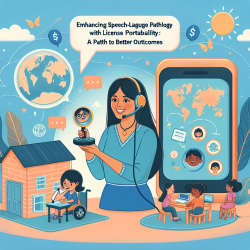As a Special Education Director, ensuring the successful implementation of family-centred planning (FCP) in early childhood intervention programs is a priority. Recent research, particularly the study "Experiences and Challenges of Health Professionals in Implementing Family-Centred Planning: A Qualitative Study," provides valuable insights into the experiences and challenges faced by health professionals in this area. This blog will explore how practitioners can improve their skills by implementing the outcomes of this research or encouraging further research.
Understanding Family-Centred Planning
Family-centred planning is an approach that emphasizes collaboration between professionals and families. It recognizes the uniqueness of each child and their circumstances, aiming to involve families in the care process and provide comprehensive support for children. This approach has been shown to improve the quality of life for children and their families by strengthening collaboration and partnership.
Key Findings from the Research
The study by Cuenca-Sánchez et al. (2024) highlights several key themes:
- Social and Work Organization: This theme explores how traditional rehabilitation or early stimulation practices are perpetuated within organizational structures, leading to resistance against adopting FCP.
- Socio-Family and Work Organization: This theme discusses how certain socio-family dynamics and work environments can promote adherence to FCP, emphasizing the importance of solid training and institutional support.
Challenges in Implementing FCP
Despite its benefits, implementing FCP in early childhood settings faces several challenges:
- Institutional Barriers: Organizational structures and policies often support traditional, hierarchical models of care, making it difficult to adopt more family-centred approaches.
- Professional Resistance: Health and education professionals may be accustomed to traditional methods and may resist changing their practices to align with FCP.
- Cultural Barriers: Cultural differences between professionals and families can lead to misunderstandings and conflicts, hindering the effective implementation of FCP.
Strategies for Improving FCP Implementation
Based on the research findings, here are some strategies that practitioners can adopt to improve the implementation of FCP:
- Enhance Training and Professional Development: Providing continuous training and professional development opportunities can help practitioners acquire the skills and knowledge necessary to implement FCP effectively.
- Promote Institutional Support: Administrators should ensure that organizational structures and policies support the adoption of FCP. This includes providing the necessary resources and creating a flexible work environment.
- Foster Cultural Sensitivity: Practitioners should be trained in cultural competence to better understand and respect the cultural backgrounds of the families they work with.
- Encourage Collaboration: Building strong partnerships between professionals and families is crucial. Practitioners should actively involve families in decision-making and service planning processes.
Encouraging Further Research
While the study provides valuable insights, it also highlights the need for further research in this area. Understanding the experiences and perspectives of professionals can shed light on the barriers and facilitators that influence the adoption of FCP. Qualitative research methods can be particularly useful in exploring these aspects in depth.
To read the original research paper, please follow this link: Experiences and Challenges of Health Professionals in Implementing Family-Centred Planning: A Qualitative Study.










